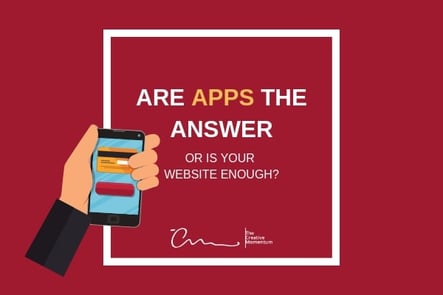
There’s one bit of marketing advice floating around out there that business owners might be tired of hearing. How many times have you been told that you need to “get your business a mobile app”?
This is a pervasive bit of pseudo-wisdom that online sources push without much rationale. They hear statistics that encourage them, such as the fact that the average American spends five hours per day on mobile devices—92 percent of which is spent interacting with apps. They hear about the importance of mobile marketing and rush to get in on the action.
But do these companies really need to invest in one? Or are they just adding more waste into their increasingly-expensive and under-utilized marketing repertoire?
The Value—and Cost—of Apps
Does your business actually need a mobile app?
Well, maybe. It really depends on your business, what resources you have, and what your company’s goals are.
Some companies do great business through their apps and make their mobile strategies a key part of their marketing. Think Starbucks or Domino’s. These folks have taken the time to build quality mobile apps that integrate well into their customer experiences and larger marketing strategies.
When done well, mobile apps bring great benefits to your company:
- New marketing channel for customer outreach
- More opportunities to build out incentives, loyalty programs, and special offers for subscribers
- Access to device information, including user behavior and interaction data that marketers can use for ongoing optimizations
These are the primary benefits. Mobile apps give your company a new way to interact with customers and encourage engagement with the brand. Users who download mobile apps tend to already have loyalty toward the brand and are the ideal market segment for value-driving loyalty programs. Plus, the user data you get from monitoring in-app activity is great for personalization of user experiences, ads, suggested offers, and more.
The True Cost of Mobile Apps
Yes, mobile apps can do a lot of things that websites can’t, but you’ll be paying a premium for the privilege. This is the primary drawback. Mobile apps are expensive.
Even basic apps may cost thousands of dollars, though businesses often end up investing tens of thousands into the development process. For this reason alone, the choice to build an app shouldn’t be made lightly.
This is the question you need to ask yourself: What can a mobile app do that my existing website can’t? Because really, the answer to this question is what you’re investing in when you get a mobile app. You’re paying for extended functionality that will—ideally—drive ongoing engagement and revenue for your brand.
But here’s the thing. Your website already offers loyalty programs. It already provides interaction data, and it’s already available on mobile. Mobile can take these ideas further, but in truth, you’re already reaping many of these benefits. Even giants like McDonald’s admit that its app adoption rates are lower than it’d like, and that’s coming from a company that had millions of dollars to throw at a global mobile app awareness campaign.
The problem is that McDonalds’ app didn’t have a clear enough value proposition for customers, so the significant investments the company made in its app hadn’t been realized. They’re trying to course-correct now, but smaller companies might not be able to swing the initial investment without something to show for it.
The bottom line is that you need a reason to build one that goes beyond what your website already offers, or customers won’t bother with it.
When Your Website Is Enough For the Job
Yes, building out your marketing and creating a new engagement channel for customers are good reasons for an app, but these alone aren’t enough. You need specific justifications for why customers should pick up their phones instead of just visiting your website.
Vik Patel at Forbes described this idea well:
“Good reasons include a genuine need for access to on-device features like the camera or accelerometer, or a requirement for graphical capabilities available only to native applications. If the functionality of benefit to the user can't be implemented on the web, you have a good reason to create a mobile app.”
Obviously, most eCommerce providers that build apps don’t incorporate this type of functionality and stick closer to traditional shopping and purchasing functions that offer experiences closer to web browsing.
In these cases, why wouldn’t the company just skip the app and invest all of those dollars into a stronger web-based UX? Your website is the cornerstone of your online presence after all, and upgrading your user experience strategies may yield a better ROI than an entire, new mobile channel.
Intelligence agency Walker reports that by 2020, companies will view the customer experience as a primary way to differentiate themselves with better potential for ROI boosts than competing on price or product. In this way, working on your established presence and improving your viewers’ on-site experience might be your best bet.
Who Needs a Mobile App?
Clutch’s Small Business Mobile Apps: 2017 Survey found that 42 percent of small businesses had a native app—which was the same number as the previous year. At least by this standard, app creation rates aren’t skyrocketing in the SMB space.
This isn’t to say that mobile apps are dying out—only that the “gold rush” mentality of every business needing one is losing steam. Your website can do most of what apps can and do it more efficiently.
You’ll need to examine the above issues in more depth to determine whether the investment will pay off for your particular business. It can be a great strategy when done right, but they’re not for everyone. For businesses without a specific need, some simple improvements to your existing web presence will be more than enough to engage your customers.


